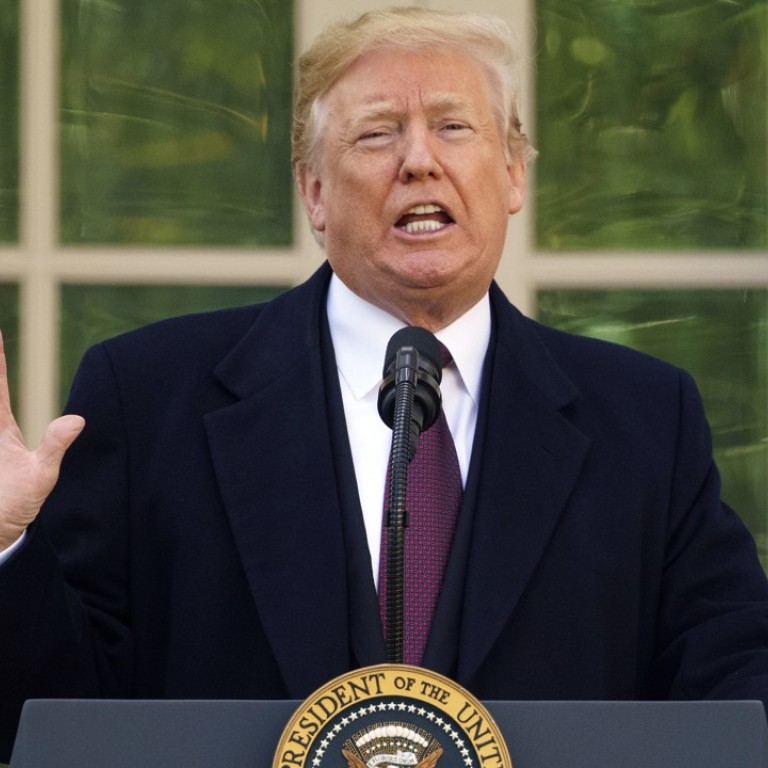
US plans to restrict foreign investments in AI and biotech may curb China’s tech ambitions
- Commerce Department proposes to expand review of foreign merger and acquisition deals to emerging technology sectors
- New rules come as Trump administration increasingly regards China as primary national security threat
The US on Monday proposed new export restrictions on additional technology sectors considered crucial to national security, furthering the Trump administration’s campaign to crack down on intellectual property theft by foreign nations including China.
In a posting in the Federal Register, the Department of Commerce identified 14 categories of new technologies – among them biotech, artificial intelligence and machine learning, data analytics and robotics – about to be subject to limits on investments by foreign entities.
“This proposed set of rules can potentially be a major change in the tech business,” said Richard Matheny III, a lawyer with the global trade group at the Goodwin Procter law firm in Washington.
“Many biotech companies, for example, that historically haven’t been subject to such controls will need to consider these restrictions, including when taking investments, collaborating with non-US persons on technology development, and exporting products.”
This proposed set of rules can potentially be a major change in the tech business
US President Donald Trump has repeatedly called on China to change its “unfair trade practices”, including what he calls the theft of US technologies, often through Chinese mergers and acquisitions of US companies.
Those concerns helped provoke the trade war that, since July, has resulted in both countries imposing tariffs on hundreds of billions of dollars’ worth of goods imported from each other.
The sectors targeted by the new rules are key to Beijing’s plan to reduce its reliance on US technology, and to “Made in China 2025”, a national plan launched in 2015 with the aim of making the country dominant in global high-tech manufacturing.
Increasingly, the administration regards China the primary threat to US national security. This month, the US-China Economic and Security Review Commission called on Congress to enforce a wide range of measures to monitor and counter China’s global expansion strategies and trading practices.
And earlier this year, the administration banned China’s telecommunications giant ZTE Corp from buying American components for seven years, as punishment for selling products to US-sanctioned Iran and North Korea. The ban, which was lifted later in exchange for a hefty US$1.4 billion in penalties, sent ZTE to the brink of collapse.
In a broader effort, Congress in August greatly expanded the national security review role of the Committee on Foreign Investment in the US, an inter-agency body also known by the acronym CFIUS.
The new law broadened the committee’s authority to include oversight of joint ventures and real-estate lease acquisitions, making foreign investment more difficult.
Monday’s proposed rules will further expand the reach of CFIUS, giving it jurisdiction over non-controlling investments in US companies that are in the emerging tech sectors, Matheny said.
International trade professionals noted that while the revised CFIUS review does not specifically target China, it is likely to dampen technology exchanges between the two countries even more, pushing the world’s two largest economies to further decouple from each other’s technological advancements.
Collaborations in technologies between the US and China will slow, these professionals said. US tech companies hoping to hire foreign nationals for research work will increasingly require Commerce Department approval and authorisation.
While cautioning that a further slowdown in tech investment and collaboration will result from the proposed rules, many still believe the change is necessary.
“Export controls and other regulations often lag a step or two behind the times,” Curtis Dombek, a lawyer in the international trade practice group at the Sheppard Mullin law firm, wrote in a blog post on Monday.
“For many years, technical know-how in many cutting-edge technical fields has not been subject to export controls. This has meant that many commercial technical innovations could be freely exported without significant restrictions.”
The rules proposal now enters a public-comment period of 30 days on what criteria should be used to identify these technologies. Once the Commerce Department collects the feedback, further discussions will ensue, with the rules expected to go into effect sometime in the new year.

